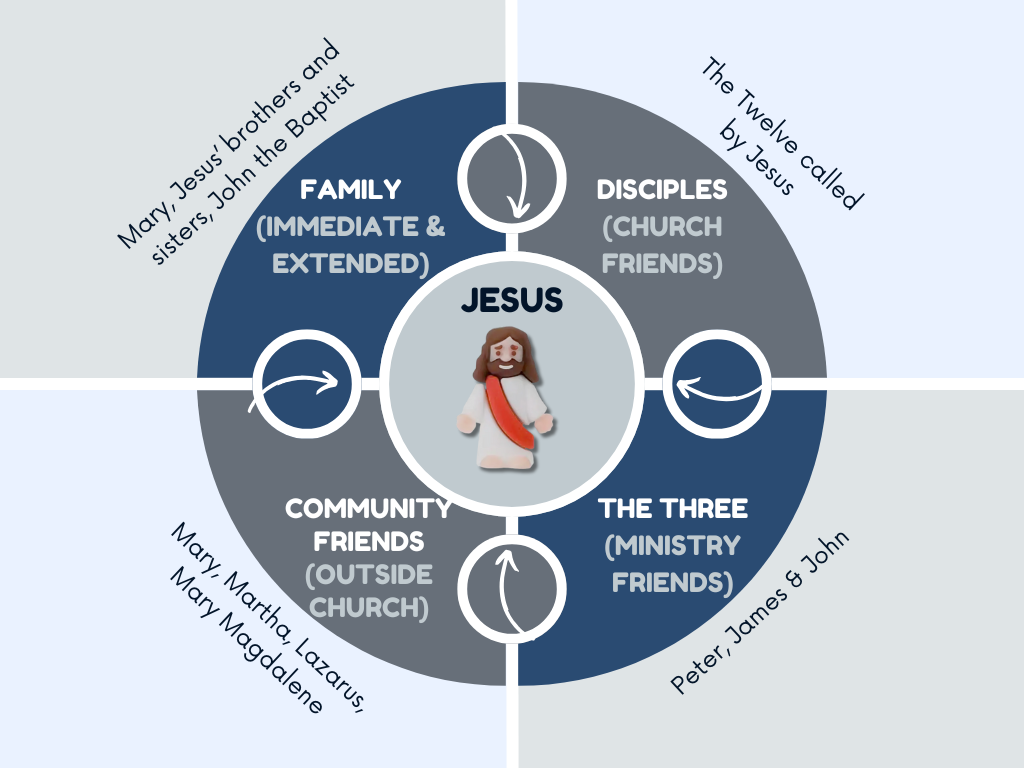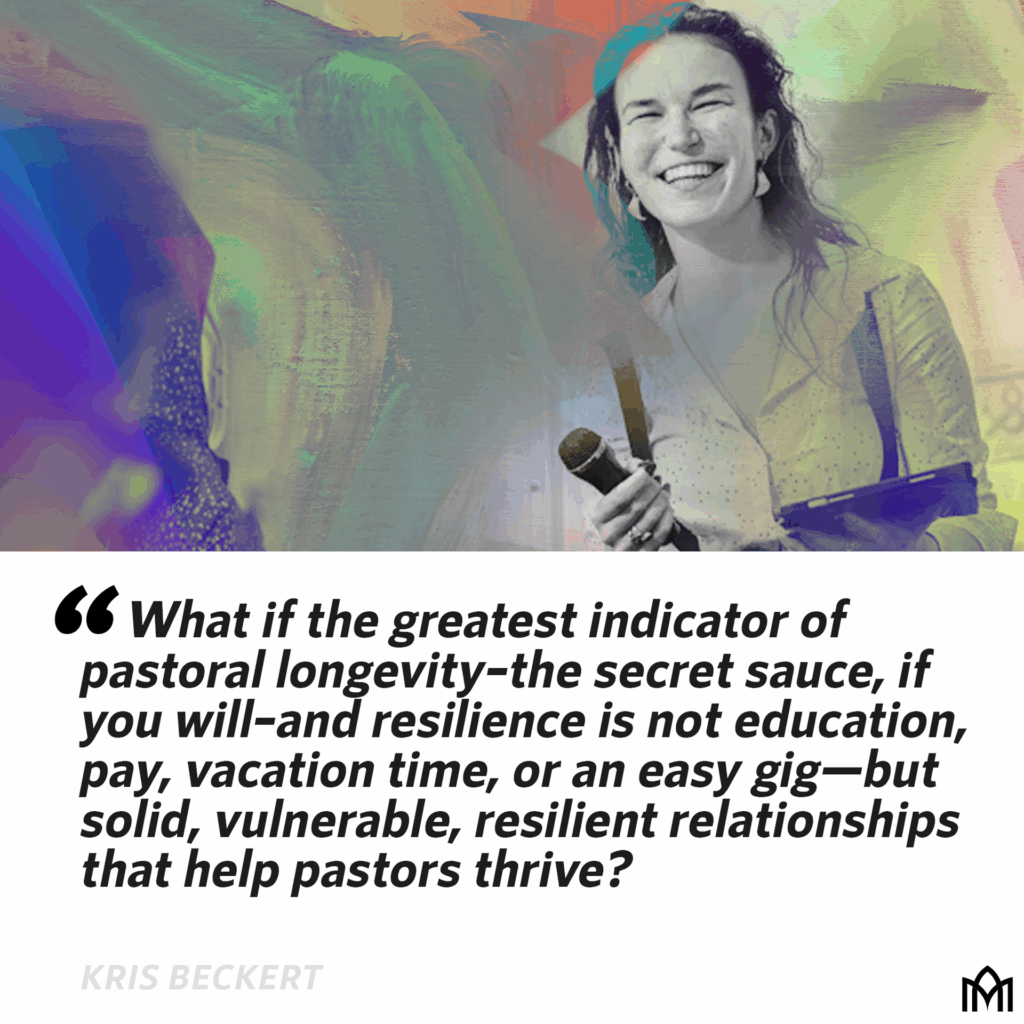The Secret Sauce For Pastoral Longevity
When I was in seminary, I said “Yeah, right.”
Responding in a similar way as my youth group teenagers did to adult advice, the warning words from my Covenant Discipleship professor went in one ear and out the other:
“85% of graduates from seminary leave full-time pastoral ministry within five years, and 90% of pastors don’t remain pastors until retirement, according to a study by Duke.”1*Editorial Note: It’s hard to find a clear citation for this statistic, although this study has been widely sited. Regardless of whether the number is exactly correct, the point remains. ~CK
The year was 2012. My classmates and I were just about a year away from graduation, and this professor had the nerve to try and scare us like that! I forget what content came next, most likely something about the necessity of the big “SCs” (self-care and soul-care), but the statistic I wanted to ignore somehow became lodged in my brain. The next year was filled with my final seminary classes, commuting, and doing lots of ministry on staff at the church I was serving. It wasn’t actually until 2021, upon accepting a call to be a Lead Pastor in Pennsylvania, that the haunting statistic again emerged from my memory. Several seminary friends posted their congratulations on my social media, which I was thrilled about, but then it hit me—None of them were continuing to serve in pastoral ministry.
As a Carolina grad, it hurt me to admit that Duke was right.
Why Do We Leave Pastoral Ministry?
However, why was the Duke study correct? I had a hard time finding statistics on the attrition of other vocations, especially those who worked with and served people. Anyone who has served a day in a church knows the reality that ministry is tough. As a mentor of mine once lovingly remarked, “If you can do anything else but go into pastoral ministry, do it.” I reflected on the tough situations and seasons I had navigated, wondering what the difference was in my pastoral experience, compared to that of my seminary friends. What drove them to leave? A living wage? Long hours? Expectations? Health issues? Family issues? Too many political battles?
While some left ministry during the COVID-19 pandemic, as part of the Great Resignation, many more had already left before that challenging season. There didn’t seem to be one central boogeyman at work, but perhaps a plethora of circumstances that led these men and women to step out of the pulpit. So what was it? After multiple meetings with pastors still serving in ministry, those who had retired, and those who were now doing something else, I discovered something: There is no one reason pastors leave ministry. But there is often one common feeling: Loneliness.
Have you ever found yourself saying one of the following things as a pastoral leader?
- “I had no one to talk to about it.”
- “I didn’t feel safe telling anyone about it.”
- “My District Supervisor, Presbyter, or Council of Elders didn’t support me.”
- “I didn’t know what to do or who to talk to.”
- “Serving a church in the middle of nowhere was lonely.”
- “Flying solo was hard.”
What if the greatest indicator of pastoral longevity and resilience–the secret sauce, if you will–is not education, salary, vacation time, or an easy gig—but solid, vulnerable, and courageous relationships that help pastors thrive?
Some recent work done on the topic of hope by Pastor Ray Johnston, Founding Senior Pastor of Bayside Church in Sacramento, California, describes it like this: At any point in time, we all have a level of challenge and a level of support. The challenge may include anything, such as your congregation not connecting with new people, to a stubborn staff member, to missing your daughter’s soccer game once again, to a bad service review on Google, etc. Simultaneously, we also have a level of support from our spouse, family, friends, pastoral mentors, staff colleagues, or our congregation. Johnston’s transformative insight: The distance between your level of challenge and your level of support is your level of destructive stress.

A Kris Beckert original!
This means that as long as your level of challenge is low, if your support level is low, you can survive ok. But when challenge is high, especially over the course of several seasons and support is low, we reach a point where we can’t take it any more. We quit our job, perhaps our calling to ministry more deeply, and ultimately for some, the Church as a whole! This insight became crystal clear to me when I examined the stories of several pastors I know who have been in ministry for the long haul. These seasoned leaders had been through the good, the bad, and the ugly in their ministry, watching as their churches experienced growth, decline, impact, failure, and everything else in between. When asked what kept them going, besides the call of Christ on their lives, they shared names of friends.
There is no one reason pastors leave ministry. But there is often one common feeling: Loneliness. Share on X
Bridging the Support Gap
If authentic relational support can make noticeable difference2(It’s worth saying that yes, we should do what we can to reduce our level of challenge by delegating ministry, cultivating healthy boundaries, saying no, and consistently practicing Sabbath., we need to realize this truth: Support isn’t created, especially at a moment’s notice. It’s cultivated. This may seem challenging for those of us who don’t have family close, are new to ministry, or who don’t have much denominational support.
But while you may not be able to change the support level of your Senior Pastor, and while you can’t depend on your congregation to always cheer for you, and while your spouse, children, parents, or family may not understand your challenges, what you can change are your friendships. As a pastor, you have real agency regarding your intentionality and investment in actually cultivating authentic relationships of support around you.
While Western culture continues to elevate romantic relationships, psychological science is learning more about the human need for platonic relationships, and the specific ways in which they foster health, bolster well-being, and lead to longevity. For example, it is well-established that friendships protect us in part by changing the way we respond to stress. See the follow five research studies as a sampling of this truth:
- Participants who have a friend by their side while completing a tough task have less heart rate reactivity than those working alone.
- People judge hills to be less steep when they are walking, accompanied by a friend.
- Married people who think of their spouse as their “best friend” report their life satisfaction being nearly twice as high as those who do not.
- Those who have friends outside of their marriage are more resilient to the stress that comes with marriage and are better able to work through marriage difficulties.
- High quality friendships protect against mental health issues, including anxiety and depression over the course of one’s life.
The opposite is true as well. A groundbreaking study of over 300,000 people discovered that those with no friends or poor-quality friendships are twice as likely to die prematurely, which is a risk factor that is greater than the effect of smoking 20 cigarettes per day. Friendships increase our baseline of support, giving perspective, buffer, and release from the challenge. Friends matter, for all of us.
But the truth is that we, as pastors, aren’t doing very well in the friend department. Whether married or single, most of us are just plain lonely.Again, the data supports this truth quite easily. A 2021 study from the Survey Center on American Life found that 12% of U.S. adults said they did not have any close friends, which had increased four-fold since 1990. Among pastors, Barna Research discovered that up to 65% of pastors are lonely, experiencing consistent isolation. Many of us in the pastoral vocation would say this reality exists for good reason: Our lives are consumed by church needs, and by needy church people. Many of us can tell stories of friendships we had in our church leadership experience that wilted for a large variety of reasons.
In his powerful book The Emotionally Healthy Leader, Pete Scazzero recalls a time he lost a close friend in the church when feelings were hurt over church vision and strategic direction decisions. Scazzero writes that the complications of overlapping roles and expectations for church leaders when friendship is involved with overall church strategy is often messy, frequently including unresolved relational conflict. As a result, many pastors learn subconsciously to not make friends in their churches at all. Obviously, this isn’t a good solution either. So what is a pastor to do with this conundrum?
What you can change are your friendships. As a pastor, you have real agency regarding your intentionality and investment in actually cultivating authentic relationships of support around you. Share on X
The Friendship Circles of Jesus
Jesus offers us a good example of our need for human friendship while stewarding the Kingdom of God. Jesus had family relationships, which were positive at times and negative at others. Jesus was unmarried, with several brothers and sisters (Matthew 13:55, Mark 6:3), and yet it is interesting that Jesus did not invite his siblings to be among his Twelve disciples. Jesus called the Twelve his “friends” (John 15:15), and this group of disciples were clearly his most consistent circle of relationships, perhaps even approximating a small house church. But even among the Twelve, Jesus had an inner circle of three with whom he was closest: Peter, James, and John.
Jesus’ relationships were not only limited to family and his 12 disciples, as he had friends outside the Twelve: Mary Magdalene, Lazarus, Mary, and Martha all played major roles in Jesus’ well-being. Interestingly, these personalities often seem more vivid and receive more ink than several of the disciples who are only mentioned in lists within the gospel records. The home of Mary, Martha and Lazarus in Bethany became a consistent place of respite for Jesus, and Jesus wept deeply at the passing of his dear friend Lazarus (John 11:35). Then there was Mary Magdalene, who, along with a group of other women leaders, supported Jesus both relationally and financially in his ministry. Mary Magdalene was the first person to whom Jesus appeared after the resurrection (John 20), and became known in early church history as the “Apostle to the Apostles.” These friendships outside Jesus’ “congregation of disciples” were all crucial parts in Jesus’ ministry, supporting him as he journeyed to the Cross and beyond.

A Kris Beckert original!
The Friendship Circles of Pastoral Leaders
In our own lives as pastors, we can think of a similar healthy web of relationships that make up our support:
- Family (spouse, siblings, parents, extended family, etc.)
- Friends in the Church (staff, pastors, leadership, members)
- Pastors at other churches (within your tribe and outside)
- Friends unconnected to your ministry (sports/interests, other parents, neighbors, etc.)
I think of the people in my own life and ministry who make up each of these categories, and how I must be intentional with each circle in a different way.
In my family, I make it a point to go on the annual family vacation, call my family regularly, and visit my brother, even though he lives several states away. I do fun things outside of church like movies, concerts, and meals with families and individuals I’ve grown close to over the years. I have also remained connected to people from previous churches to whom I am no longer their “Pastor.”
I go kayaking, out to lunch, on retreats, and hang out with pastor friends I’ve met from our local Ministerium, from my own denomination, and from both the Ascent Movement and Fresh Expressions organizations with whom I also serve. I also have a long term mentor and his wife who serve at a church about an hour away that I make a point to see as often as possible.
Hanging out with a group of friends I met at Tuesday Night “Trivia Nights” at our local pub has become a consistent part of my weekly rhythm. I love playing ice hockey and going running, heading out on the town for a “girls night” with two ladies who have become good friends to me, and simply inviting people over to my house. I sometimes make a point to attend a local megachurch’s hiking events. I enjoy going out for burritos with a friend who is also a female community leader in my city, but works in local government. I love that these friends know me not as ‘Pastor Kris,’ but just plain ‘Kris, who happens to be a pastor.’
I find that the last two categories of relationships in particular require extra effort and intentionality for me. There is always church work that can take up my time, especially during my evenings, draining my emotional energy to the point I just want to sit on the couch and watch Hulu instead of being around any more people, even those I like! I also find that virtual chats and phone calls with friends far away are good, but I need IRL (in real life) friendships too. (There’s something about physically sitting at a table or playing a game together that screens just miss.) I have to remind myself that friend time is just as important as family time, and doubly as important if you are single or live in an isolated area.
I hope to be an exception to the statistic of pastoral burnout and ministry implosion. I know that there are factors beyond my control, as there were for many of my colleagues. There ultimately is no secret sauce for pastoral longevity.
But friendships are good for everybody, even pastors.
Especially pastors.
///
Support isn’t created, especially at a moment’s notice. It’s cultivated. There ultimately is no secret sauce for pastoral longevity. But friendships are good for everybody, even pastors. Especially pastors. Share on X




